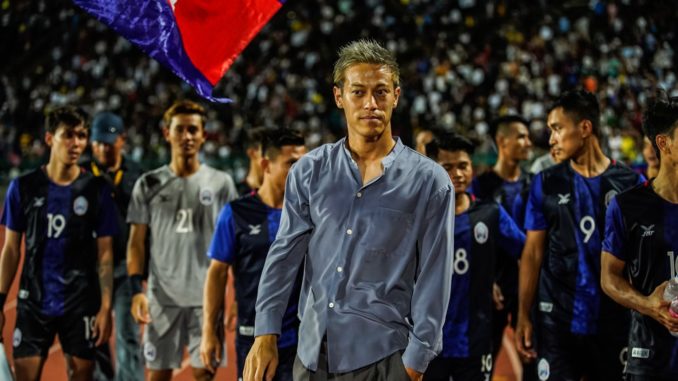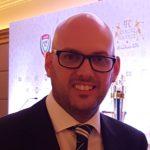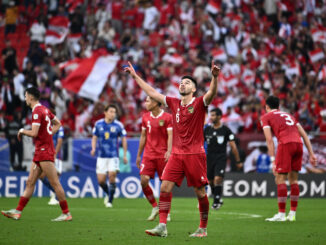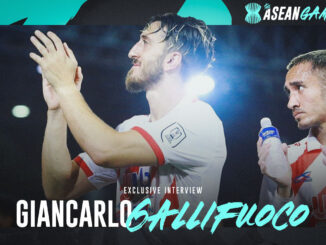
Keisuke Honda has never been afraid to forge his own path.
His unique personality sets him apart in the world of Japanese football, where conforming and adhering to centuries old traditions and hierarchy is the accepted norm.
From his shock of blonde hair, extrovert personality and bold claims of wanting to win the FIFA World Cup, Honda is not your typical Japanese footballer. When it comes to Honda, nothing is ever a surprise. We have become accustomed to expecting the unexpected.
But despite all of that, when he popped up in Cambodia in August 2018 as the new coach, or should that be ‘general manager’, of the Cambodian national team, no one quite knew what to make of it. After all, he had just signed a lucrative new contract with Australian champions Melbourne Victory.
How could a current player also take charge of a national team?
Player-coaches have been seen before, but that is always at the same club and, in this age of professionalism, is a role consigned to mostly history.
But player of one team, coach of another, 7,000km apart – how would that work?
“When he was appointed, the main question of everybody’s lips was how he would juggle a playing career in Australia with managing a national team,” said Ismail Vorajee, a freelance journalist and former sports editor of the Khmer Times.
“It’s an arrangement which would be unheard of in many other places. But for me it’s the fact that it is Cambodia, that he is able to do this.
“Many things here are difficult to explain and decisions made by the Federation are often inexplicable and sometimes downright peculiar.
“But he is backed fully by the Federation, for a role in which he is taking no salary, purely for the good of the Cambodian game.”
The fact that he, nor his sidekick, Felix Dalmas, take a salary for the position is often overlooked but is a demonstration of how serious they are about their project to develop the game in Cambodia.
“To explain it you have to understand a little about Keisuke,” Dalmas explained to The Asian Game.
“He’s somewhat of a unique character in the soccer space. He has investments, he has schools, he has his own companies and he has a fund with Will Smith. He is a renaissance man you could say.
“Everything he does is a little bit unusual. He does things because he always wants a challenge.
“I started knowing Keisuke a few years back and he had this idea that he wanted to become a coach at some point. He had strong feelings for Cambodia and for the people he knew here, and he wanted to find a way to help them.”
The two, from different backgrounds and different parts of the world, share the same belief systems which makes their arrangement easier to manage, according to the Argentine.
“We share a very similar view, which is pretty unusual because I grew up in a different part of the world, (with) different parents, (in a) different culture,” Dalmas said.
“But our goals and our beliefs are very similar, not only in soccer but in life.
“Our belief is that talent and effort and the ability to do things are universal. The biggest difference is the opportunity. Opportunity is not universal.
“I believe Keisuke and myself and the team here, we want to make that accessible. We want to make that opportunity available to people and use soccer as a means of education – creating good habits, creating resilient people, people that do not falter when adversity comes, people that don’t make excuses when things aren’t going their way, people that are organised, are systematic, that set a goal and try to achieve it.
“We always focus on growth and not the success. I believe that those are skills that will allow you to achieve any goal, not just being a professional soccer player.”
The task in front of Honda and Dalmas was a significant one.
When they took over the job, the Angkor Warriors were ranked 166 in the FIFA rankings, which put them at number 34 in Asia.
Given their unique and shared beliefs, this was not going to be a job where they came in and set up Cambodia to just defend in the hope of earning a few underdog results. They wanted to create a longer term legacy, and they knew that would mean short-term pain.
“We have a different approach to games, we understand where our team is, we understand where Cambodian soccer is at the moment,” Dalmas explained.
“We’re very sincere and passionate about what we say to the players. We’re 100 percent honest in our belief.

“I feel when you speak with transparency to the players and when you explain, not just tell them, but explain why and show them the vision a lot of players, it’s not so much ‘buy in’, they join our beliefs.”
And that’s exactly what the players did.
“They want to improve Cambodia football to develop our country,” captain Soeuy Visal told The Asian Game.
“Their vision mainly focuses on the principle of play with anemphasis on ‘don’t be afraid to make mistakes,’ and they always encourage players to play.
“They give us much belief and confidence that we can do better, and they encourage us to be brave and to play the way we want to play.”
The early signs in World Cup qualifying were good, with a win in the preliminary playoffs against Pakistan earning them a spot in the second round where they were drawn in Group C alongside Iran, Iraq, Bahrain and Hong Kong.
“The Pakistan qualifier was very telling,” Vorajee said.
“The team, very young and with few stars, played some great football to secure progress to the group stage.”
They followed that win over Pakistan with two impressive performances against Hong Kong and Bahrain, both at home, earning a point against Hong Kong before a narrow loss to Bahrain.
But the performances in both games gave optimism that the ‘project’ was on the right track.
The came the game against Iran and that 14-0 loss.
“We knew the challenge (against Iran) was enormous, maybe the biggest challenge we’ve faced so far,” Dalmas explained.
“Especially because Iran’s strength is exactly our weakness. They’re physicality is their strength, that’s why they dominate this region. So we were faced against an opponent that was going to expose our weaknesses. And we knew that coming in.

“But our main focus is to improve our game, and one of the things that we talk about most, the best way to improve is to fail. To try. To be able to have the courage to try something, get feedback and then improve.”
With that being the case, there are a lot of lessons to be learned from the loss in Tehran. But it won’t derail the ‘project’ and the long-term goal for Honda and Dalmas.
“We know physicality isn’t our strength, so we will try to win the game by keeping possession, by thinking ahead of time, by moving quicker,” Dalmas said. “Unfortunately we were not able to do that, but for moments of the game you could see those sparks and we focus on that after the game.”
Parking the bus in the hope of pinching an unlikely result, Dalmas explained, was never an option. It’s not the way they operate.
“As a player, as a human, the biggest thing that stops our growth is the fear of failure,” he said.
“When the game started we had an option of saying, ‘OK let’s drop back, let’s accept this for what it is’.
“We had that option at the beginning, we had that option during half time, but we decided as a team that would be losing twice. We felt that we had to truly measure ourselves against the best.
“And I feel that’s why it was easier for the players to take it as a learning experience and move on.”
Those players are some of the youngest in World Cup qualifying, with their last 23-man squad having an average age of 23, with 12 of the players aged 22 or under.
This is not by accident, Honda and Dalmas have also taken over the Olympic team, so this is a deliberate decision to create a new generation of players to take Cambodia forward.
“Cambodia are a very young squad, and I think this is something which attracts Honda and Dalmas,” Vorajee said.
“A beneficiary of this has been young Sieng Chanthea, a pacy 17-year old winger-cum-forward who lit up their recent FIFA qualifiers against Pakistan, Hong Kong and Bahrain.
“A talent like his can easily go to waste if not properly nurtured and in the past, either through Federation mismanagement or lack of opportunities, his development would have been curbed through no fault of his own.
“If and when the time comes for Chanthea to make that decision on whether to play abroad, I think all Cambodians – and Keisuke Honda – will back him 100 percent.
“If he is to reach his potential, it’s vital he develops outside of Cambodia.”
One of the few Cambodians to have plied his trade outside of the country is Chan Vathanaka, who has had spells in Japan and Malaysia.
The undoubted star of his generation in Cambodia, he has arguably not made the most of obvious talent. But the 25-year-old had been an established figure in the national team since his debut in 2013 as a 19-year-old, so it came as a big shock recently when Honda and Dalmas made the big call to leave him out of the side.
It was a line-in-the-sand moment and showed they were prepared to make the tough calls, even if it may prove unpopular.
“They have definitely not been scared to make big decisions and there can perhaps be no better illustration of this than their refusal to pick Chan Vathanaka – by far the biggest star in Cambodian football,” Vorajee explained.
“Dalmas, who hosts various Q&As on the Federation’s Facebook page ahead of matches has consistently claimed that while he respects Vathanaka and admires his ability, the focus is on the future and fostering a cohesive unit rather than relying on individuals.
“In one of those Facebook live streams, one thing he said really stood out; “A team of 10 Messi’s or 10 Cristiano’s cannot win by themselves.”
While the immediate focus is on the trip to Hong Kong in November, Honda and Dalmas always have one-eye, perhaps both, on the future. They are here to create a lasting legacy, not a quick fix.
“The duo have consistently claimed that they have their eyes on the future and especially the Phnom Penh 2023 SEA Games which will be hosted here,” Vorajee said.
“It’s a massive regional event and while Cambodian’s football team have never really impressed in the competition, it is hoped that Cambodia can do themselves proud (at home).”
To achieve that, Honda and Dalmas know a lot of hard work still needs to be done to grow the level of professionalism, on and off-the-park.

“We don’t want to just come to Cambodia and leave and not leave anything behind,” Dalmas said.
“The effort that we’re putting in is for the system, the program and the people working in soccer to be able to grow. The biggest challenge is every day, continuing taking this program one step further.
“I feel like that’s the biggest challenge because progress happens slowly.
“Most of these players don’t have the life you’d imagine a professional player would have. They have struggles and they have difficulties in their life, and sometimes its hard to be professional 100 percent of the time and be hungry 100 percent of the time and that’s something that we work on.
“The guys are working really, really hard to keep on track, to stay on top of their game and that’s something that takes a lot of time and dedication from us, from our staff and from our players.”
It’s these small lessons of professionalism from Honda, a player that has experienced all the professional game has to offer, that are so beneficial for the players, according to Visal.
“I learnt from his professionalism that we must respect our work and roles on and off-the-field,” the 24-year-old said.
“Furthermore, I learned from him how to eat the right food to energise before and after the game. Sleeping is crucial for a player so I have to also get enough sleep so when I train I can train harder.
“Each player needs to know themselves clearly what are our weak points so then in training we can fix them, and develop to be a true professional player.
“(We must) concentrate and listen to the coach and also understand the detailed points that they instruct us. We need to build our own confident way to play football.”
Honda is a player that has achieved a lot during his decorated career, but if he can see his vision for Cambodia come to fruition it will arguably be his greatest success and, you suspect, the most rewarding.
Photos: Football Federation Cambodia Facebook
Listen to our interview with Felix Dalmas from the AFF Suzuki Cup last year on Episode 22 of The Asian Game podcast.




